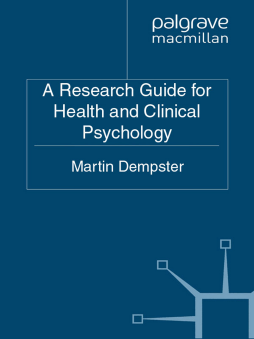
Additional Information
Book Details
Abstract
This must-have, practical guide for trainee psychologists working towards their British Psychological Society (BPS) qualification in either health psychology or clinical psychology is designed to address the key concerns and questions that students often have when applying research designs in real settings.
The book:
- looks specifically at what is required to demonstrate research competence for the qualifications;
- is structured around a simple question-and-answer format, making it easy to navigate;
- is packed full of tips, including on ethical considerations and conducting qualitative and quantitative research designs; and
- uses health and clinical psychology research examples to highlight key issues for trainees.
The best book on research methodology that I have ever read.' - Dr Richard Cooke, Health Psychologist, School of Life & Health Sciences, Aston University, Birmingham, UK
MARTIN DEMPSTERis Research Co-ordinator for the Doctorate in Clinical Psychology programme at Queen's University Belfast, Chair of the BPS Division of Health Psychology – Northern Ireland, and Chief Assessor for the BPS Qualification in Health Psychology.
He is a Chartered Psychologist and a Health Psychologist with12 years ofexperiencein conducting research in the areas of clinical and health psychology, including the supervision and assessment of many professional doctorate and PhD students.
Table of Contents
| Section Title | Page | Action | Price |
|---|---|---|---|
| Cover | i | ||
| Halftitle | ii | ||
| Tiltle | iv | ||
| Copyright | v | ||
| Dedication | vi | ||
| Contents | viii | ||
| List of Tables | x | ||
| List of Figures | xi | ||
| List of Boxes | xii | ||
| Acknowledgements | xiii | ||
| 1 The Role of Research in Health and Clinical Psychology | 1 | ||
| 1.1 Psychologist versus researcher | 2 | ||
| 1.2 Thinking about research | 6 | ||
| 1.3 Research collaboration | 9 | ||
| 1.4 Summary | 14 | ||
| 2 Systematic Literature Reviews | 15 | ||
| 2.1 What are systematic reviews and why are they useful? | 15 | ||
| 2.2 The review protocol | 17 | ||
| 2.3 Conducting the review | 26 | ||
| 2.4 Synthesising and disseminating the data | 31 | ||
| Summary of the Systematic Review Process | 46 | ||
| Further reading | 47 | ||
| 3 Developing a Research Proposal | 48 | ||
| 3.1 Developing a research idea | 48 | ||
| 3.2 Content of the research proposal | 54 | ||
| 3.3 Research governance and ethics | 67 | ||
| Summary – developing an applied research proposal | 76 | ||
| 4 Designing Quantitative Research | 77 | ||
| 4.1 Study validity/quality | 78 | ||
| 4.2 Choosing a data collection instrument | 89 | ||
| 4.3 Small n experiments | 96 | ||
| 5 Analysing Quantitative Data | 100 | ||
| 5.1 Getting help | 101 | ||
| 5.2 Common statistical tests | 103 | ||
| 5.3 Common problems | 110 | ||
| 5.4 Calculating sample size | 124 | ||
| 6 Qualitative Research: General Questions | 130 | ||
| 6.1 Study quality | 131 | ||
| 6.2 Collecting qualitative data | 140 | ||
| 7 Qualitative Research: Theoretical Approaches | 145 | ||
| 7.1 Experiential approaches | 147 | ||
| 7.2 Discursive approaches | 154 | ||
| 8 Evaluating Psychological Services | 157 | ||
| 8.1 Service-related projects vs research projects | 157 | ||
| 8.2 Balancing scientific rigour with practicability | 161 | ||
| 8.3 Characteristics of a good quality service-related project | 166 | ||
| 9 Research Write-up, Viva and Dissemination | 170 | ||
| 9.1 Writing a research report | 171 | ||
| 9.2 Presenting statistical findings | 178 | ||
| 9.3 The viva experience | 183 | ||
| References | 187 | ||
| Index | 193 |
